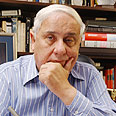The customary Israeli tendency for many years now is to sigh loudly, say “thank God,” and go back to the daily routine when we go through a relatively lengthy period without terror attacks. We see no bleeding headlines and no photos of victims on the front page. We sigh with relief and go back to the normal course of life; working in the morning and watching television at night.
The great Menachem Begin once promised us 40 years of quiet, yet he was not granted even 40 hours. However, the fact is that for the time being there are no terror attacks.
The quiet on the terror front has several reasons, and only the last one on the list is the IDF’s deterrent power. Operation Cast Lead did not leave too many Palestinians shaking with fear. So the question is: What does the future hold? Who and what is hiding behind this quiet, and what are they preparing for us, both openly and secretly, for the day after? What will we regret in a year or two for not doing yesterday and today?
Reality is staring at us from every newspaper and television screen: Hamas is boosting its strength, with Iran and Hezbollah assistance. It completely controls the Gaza Strip. Meanwhile, the Palestinian Authority is gaining strength in Judea and Samaria, mostly thanks to the IDF’s bayonets. Israel’s declared aim is to break Hamas and reinforce the PA. Yet here’s a question: What will happen, if it ever happens, when Fatah and Hamas join forces and proceed to lead the Palestinian people together?
The great experts, including members of the military intelligence branch, Mossad, Shin Bet, and many others say this will never happen. There are a thousand reasons why not. Yet others argue that this will indeed be happening, and that we must be prepared to face this dire possibility.
United Arab front
Hamas and the PA have a common enemy – Israel. These are two nationalistic organizations that have one aim in mind, just like (notwithstanding the many differences) Hagana and Irgun in the era before Israel’s establishment. The latter Jewish groups fought separately against the British in order to secure the same end goal, and succeeded.
Indeed, at this time it appears that Hamas and Fatah will never find the middle ground – the PA espouses negotiations at this time while Hamas demands violence – yet who can guarantee that they won’t compromise tomorrow and join forces despite all?
Binyamin Ben-Eliezer has referred to this junction as an “emergency intersection”: We must quickly decide whether to engage in intense negotiations with the PA, or watch it, relatively soon, join forces with Hamas; then, Israel will face a new and dreadful reality – a united front comprising the PA, Hamas, and Israel’s Arabs.
This union will grant Hamas legitimacy on the global front, and some observers say it is no coincidence that in the past year it has been trying to curry favor with international public opinion. Some argue this is an inevitable socio-political process, and that in a month or a year we will wake up in the morning to see Abbas and Ismail Haniyeh embracing on the front page.
The conclusion is as follows: The quiet on the terror front is intoxicating and deceitful. For Israel this is merely a lull, and each minute must be utilized for negotiations with the Palestinians. When Prime Minister Benjamin Netanyahu argues that there is nobody to talk to he’s right, yet this is the same argument we heard from different leaders ahead of the Yom Kippur War, and ahead of many other cases that ended with terror and casualties.
Any Israeli prime minister who is a real leader and visionary knows what to do at 5 pm, when it’s still quiet, so that the calm will still be there at 7 pm. Does Bibi know?
















